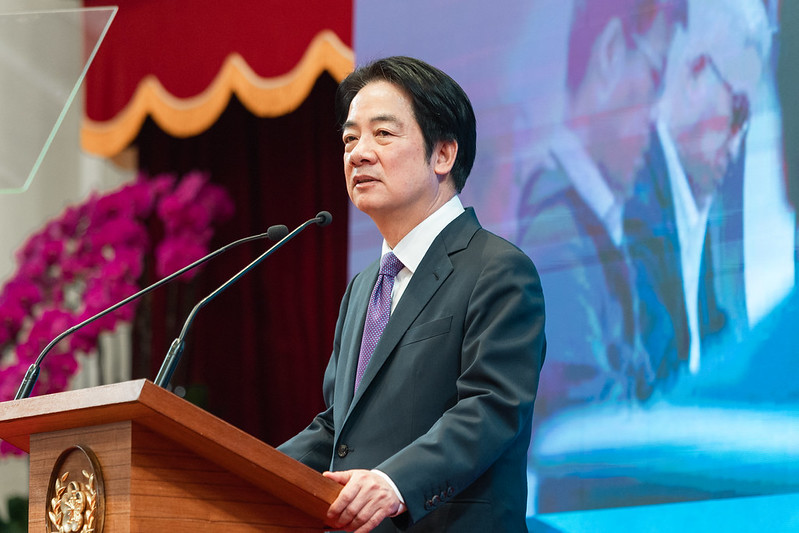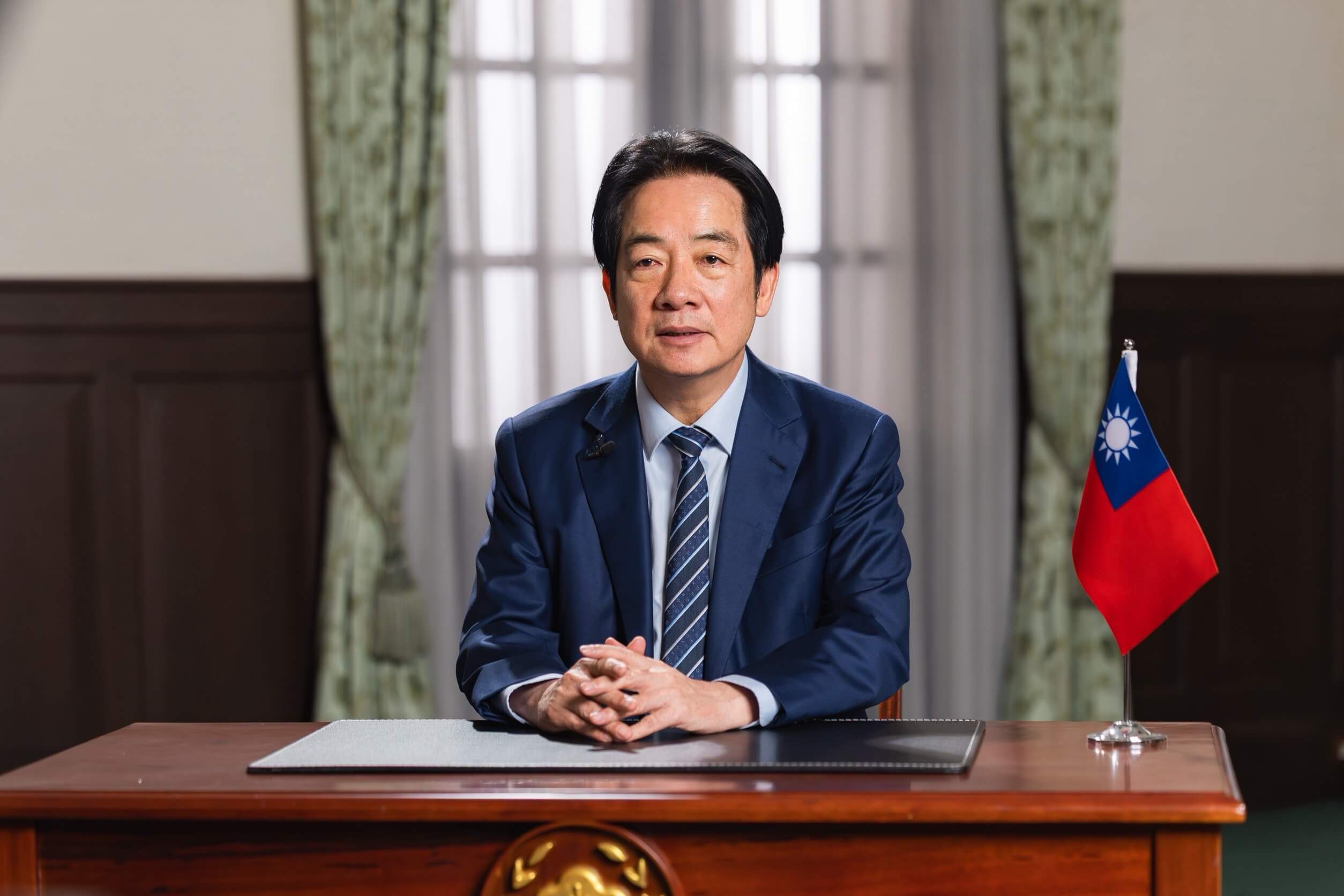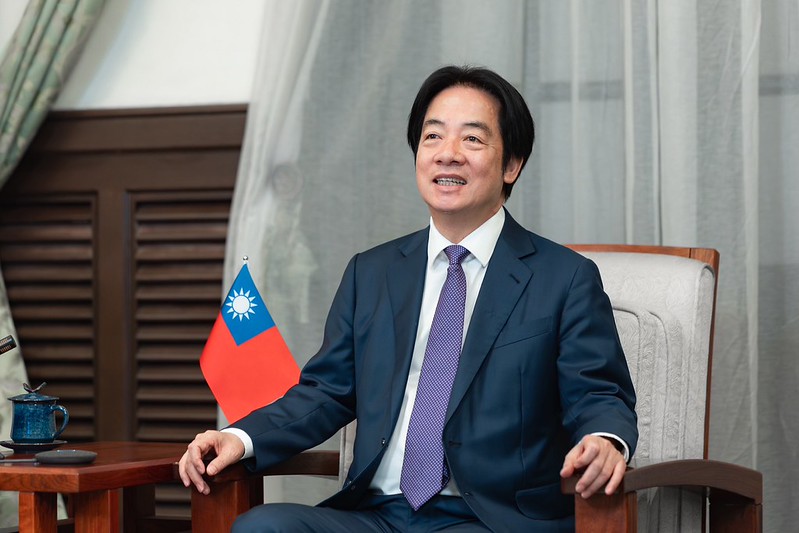News & activities
 News releases
News releases
On the morning of December 31, President Tsai Ing-wen attended a year-end press conference at the Presidential Office for the domestic and international press corps. In her year-end address to the assembled journalists, President Tsai declared that the government during the coming year would make an all-out effort to boost the economy, continue forward with major reforms, respond to changing international conditions, maintain peace and stability, and seriously address divisive issues. The president also called on all the people of Taiwan to face challenges with unity and together ring in the year 2017.
The following is a translation of President Tsai's remarks:
Friends from the media, fellow countrymen:
Good morning!
I'm very happy to see you. I would like to use today's address to report to the people of Taiwan on two matters. The first is what the government has done in 2016. The second is what the government will do in 2017.
On May 20, my administration took on the heavy responsibility of governing this nation.
The 5+2 industrial innovation program, which will play a key role in the restructuring of our economy, is being implemented step by step. The Shalun Green Energy Science City project was launched on November 6, and the Taiwan International Agricultural Development Company was founded on December 5. Also, the headquarters for the "Asia Silicon Valley Development Agency" was formally opened on December 25. And the headquarters of our biomedical industry initiative is scheduled to open in early 2017.
On the food safety front, the Organization Act of Chemical and Toxic Substances Bureau, Environmental Protection Administration, Executive Yuan, has been enacted, and the Chemical and Toxic Substances Bureau has now been established. This constitutes an important foundation for the "Five Links of Food Safety" that we are working to create.
As for our social safety net, enactment of the Housing Act ensures stronger support for social housing in terms of land acquisition as well as funding and human resources. Also, our Long-Term Care 2.0 program is now underway on a pilot basis, and is gradually bringing about long-term care services that can be “found, seen, and accessed.”
In the area of labor rights, a recent amendment to the Employment Service Act greatly advances the human rights of foreign migrant laborers. Elsewhere, to raise the minimum wage and implement a five-day work week while still affording enterprises a degree of flexibility, we have passed an amendment to the Labor Standards Act. I want to emphasize that Taiwan's labor environment is improving.
We are very clear about the pace of our measures. We are building a solid foundation for Taiwan's future development. Our task in 2016 was to "drive the piles," so to speak. In 2017, we will move quickly ahead with "construction." These are the two most critical years for Taiwan. The new government has decided to take on all difficulties right from the start because we firmly believe that, in order for the people to enjoy the fruits later, the government must do the tough labor first.
Next year, my administration will be zeroing in on the following four main focal points:
First, we will make a concerted effort to boost Taiwan's economy. This will be our most important task in 2017.
The economy has gradually picked up steam this past year, but it is still not strong enough. The government has a responsibility to use public policy and investments to create new momentum, and make the economy more active and resilient, so that it can emerge stronger.
Beginning next year, in an effort to escape from our current economic doldrums and inject new vitality for growth, the government will take a two-pronged approach. One is to "accelerate measures to restructure the economy"; two is to "expand infrastructure investment across-the-board."
At the time of my inauguration this past May 20, I said that in order to completely transform Taiwan's economy we must bravely set out to build a "New Model for Economic Development" for Taiwan. To get this very difficult economic restructuring process started, over the past seven months we have completed preparations for several economic development programs, and made the necessary budgetary appropriations. The relevant government agencies, moreover, are hard at work drafting new legislation and amending existing ones.
Economic restructuring is the key test of our ability to execute policy. As soon as plans are complete, legislative hurdles are cleared, and annual budgetary appropriations have been made, we must press full speed ahead with implementing economic development strategies that impact people’s lives—including the 5+2 industrial innovation program, renovation of old residential buildings, construction of social housing, long-term care, and childcare.
Execution of these policies and programs will require integration of human resources, funding, and technologies. It will also call for planned utilization of national space, division of labor and cooperation among the central and local governments, and regional joint governance – all highly complex undertakings.
For this reason, the government is going to establish powerful mechanisms for coordination and integration in order to improve its capacity for execution and ensure the smooth implementation of our various policies and projects.
On another front, we will also adopt forward-looking, proactive fiscal policies to expand the full range of infrastructure investments, including local development as well as the basic infrastructure needed by the next generation.
The government is actively gauging the level of demand for local development, and in the future will attach high priority to multi-county projects that put a premium on regional joint governance, and to important infrastructure in relatively underdeveloped regions that have been hampered in the past by insufficient investment. This should be an effective way to spur overall local development and promote inter-regional balance.
As for the overarching infrastructure needs of the next generation, we are gauging demand for particular types of projects, including the following:
First is the build-up of a green rail transport system that integrates Taiwan High Speed Rail, the Taiwan Railways Administration, and local mass rapid transit systems.
Second, there is infrastructure for broadband and super-broadband cloud communications.
Third is engineering projects to combat flooding and droughts likely to accompany climate change.
Fourth is soft and hard infrastructure needed for an ageing society.
Fifth, we must strengthen the infrastructure needed for basic scientific research.
And sixth, infrastructure is needed to support a shift to non-nuclear and low-carbon sources of energy.
This coming March, the Executive Yuan will propose a fully fleshed-out and forward-looking infrastructure plan to guide our future efforts.
The sorts of development initiatives I've just mentioned are all national-level mid- to long-term undertakings aimed at expanding domestic demand. They will require huge investments, and will spur increased economic activity. We will determine an order of priority and timeframes for execution. We do not discount the possibility of future budget increases or the adoption of special budgets as a means of accelerating implementation. At the same time, we will also make good use of financial engineering to attract private-sector investors, which would spur increased private investment.
We are currently reviewing our tax system, and hope to carry out a reasonable reform of the system, striking a proper balance between fiscal soundness and tax fairness. We don't want distortions in the tax system to affect the sound development of our economy or the competitiveness of our industries.
Our second task in the coming year is to continue major reforms, with pension system reform a top priority.
After 20 meetings of the Presidential Office Pension Reform Committee, the reform process is entering the next phase with regional meetings and a national congress. We expect to submit a proposal to the Legislative Yuan during its next session.
The pension system is on the verge of bankruptcy, an issue that history has left for us to deal with. The system is now in dire need of reform because in the past, Taiwan society never took responsibility for thoroughly examining this system, and instead let it gradually deteriorate to the brink of insolvency.
So the crux of the pension reform issue is financial sustainability. Simply put, we need to ensure that people will actually be able to collect their pensions over the long term. As Vice President Chen Chien-jen just said, pension reform cannot possibly be accomplished all at once. But we hope that the concerted efforts of all parties, and especially our current efforts, will ensure that for the next generation, a period of about 25 to 30 years, the pension system will remain financially viable.
Of course, ensuring that the reformed pension system remains viable for a generation is just the first step. We sincerely hope that it will become standard government procedure to review the pension system once every ten years. Each review will ensure financial viability of the pension system for the following 25 to 30 years. Only by conducting regular reviews, decade after decade, can we ensure pension security for future generations.
This issue should transcend partisan politics. In other words, no matter which political party is in power ten years from now, they will be able to review the pension system at regular intervals for the ultimate good of the people of Taiwan.
Our third task for the year 2017 is to adapt to changing international circumstances and maintain peace and stability. In the midst of these changes, we must also find opportunities to play a more proactive role in regional security, economics, and trade.
Taiwan needs to play a constructive role in Asia, and take on more responsibility. We are committed to trade liberalization, and will not retreat into defensive isolationism.
We will vigorously promote the New Southbound Policy, and conduct more diverse exchanges and interaction with the countries of Southeast Asia, India, New Zealand, and Australia. For the New Southbound Policy, 2017 will be a year of action.
We will also continue our on-going dialogue with important trading nations and regions including the US, Japan, and the European Union to strengthen bilateral and multilateral economic cooperation. By pursuing mutual benefits and win-win value, we will expand our external economic and trade relationships and revitalize Taiwan’s economy.
In foreign affairs, I remain committed to the concept of steadfast diplomacy through mutual assistance for mutual benefits. By expanding cooperation at all levels we will strengthen Taiwan’s substantive relationships with other countries.
Next week I will be visiting four of our Central American allies. My visit will not only consolidate friendly ties, but will also boost the morale of our frontline diplomatic personnel. Even more, I want to show the world Taiwan’s resolve and determination.
Since May 20, we have endeavored to maintain peaceful and stable relations across the Taiwan Strait in accordance with the people’s will and consensus in Taiwan. Driven by our respect for history and the spirit of seeking common ground while setting aside differences, we have continuously expressed goodwill towards the other side across the strait. We hope that the two sides can gradually reduce confrontations and differences through positive interactions.
But in the past few months, it has been the general feeling of the Taiwanese people that the rational and calm position that both sides have worked hard to maintain has seen certain changes. Step by step, Beijing is going back to the old path of dividing, coercing, and even threatening and intimidating Taiwan. We hope this does not reflect a policy choice by Beijing, but must say that such conduct has hurt the feelings of the Taiwanese people and destabilized cross-strait relations.
For the sake of safeguarding regional peace and prosperity, I want to once again reiterate that our commitments will not change, and our goodwill will not change. But we will not bow to pressure, and we will of course not revert to the old path of confrontation.
Whether cross-strait ties can take a turn for the better in the coming year will depend on our patience and resolve. But it will also depend on how Beijing sees the future of cross-strait relations, and whether it is willing to assume its share of the responsibility for building new models for cross-strait interactions. This is necessary to answer the collective hope for peace from the people on both sides of the strait, as well as the different parties in the region.
The new government’s fourth task for 2017 is to seriously address divisive issues. As president, I will not stand back on these issues. I need to find space for dialogue between divergent opinions, and then find a reasonable way to resolve differences.
The ill-gotten party assets issue is one such dispute. This issue is a vestige of the party-state of the past, but in the present democratic era, everyone should put their preconceived ideas aside to address these historical problems.
So here, I am issuing an appeal to the Kuomintang (KMT). To resolve this issue, we should sit down and talk, and replace confrontations with negotiations so that we can quickly relegate the ill-gotten assets issue to history, and give Taiwan’s democracy the space it needs for sound development.
Tomorrow is the first day of the year 2017. Since taking office, I have put great emphasis on improving the image of our armed forces, and they will be given a prominent role in tomorrow’s flag-raising ceremony in front of the Presidential Office Building. For the first time in history, exemplary members of our armed forces will lead everyone in singing the national anthem, and I hope that all of our fellow citizens will and cheer them on in solidarity.
In the spirit of tomorrow’s new-year flag-raising ceremony, let me close with a call to mutual support and encouragement: “United Together in 2017.” Let’s all come together to face the challenges of tomorrow, and welcome the year 2017.
Best wishes to one and all for a happy new year.
Following her speech, President Tsai fielded questions from the media about Taiwan-US relations, disputes over Japanese food imports from nuclear disaster areas, marriage equality, and policy issues surrounding Taiwan’s economy and trade, external relations, education, and the Hakka ethnic group.
Vice President Chen Chien-jen (陳建仁), Acting Secretary-General to the President Liu Chien-sin (劉建忻) and Deputy Secretary-General Yao Jen-to (姚人多) were also in attendance.







